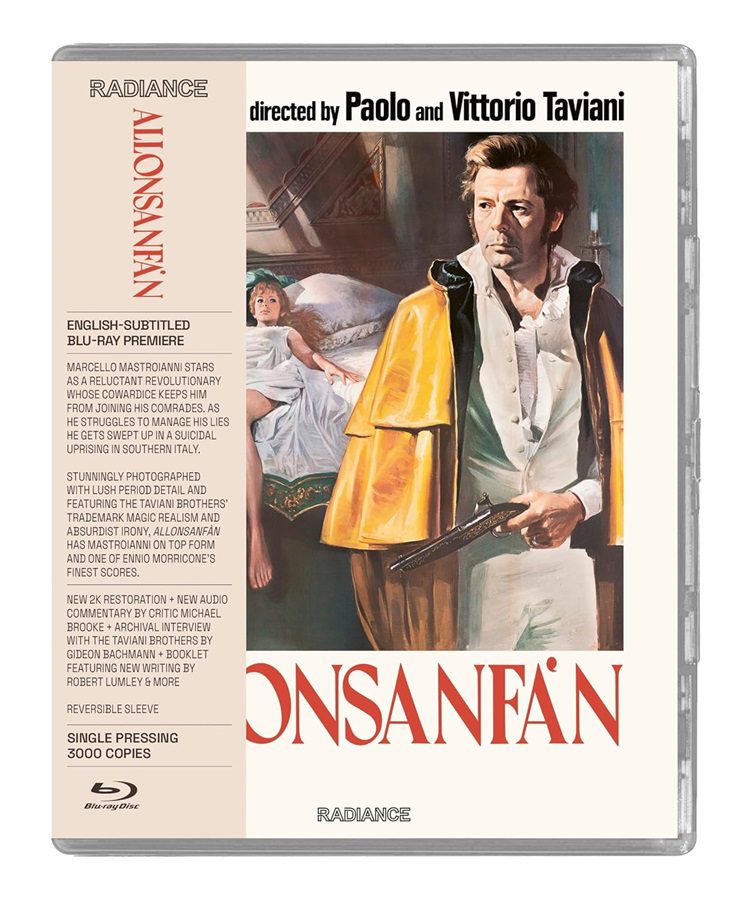
After the downfall of Napoleon, Europe had to pick up the pieces and redraw the lines between countries. For quite a few nations, this meant re-establishing a King or Queen and basically starting where they left off. Italy reunited its various states into one nation now called the Kingdom of Italy. But revolution was in the air. Not everyone wanted a king; not everyone wanted to go back to the old ways. Some wanted a republic for the people. Like France had before Napoleon took over. They were willing to fight for that. They were willing to die.
Buy Allonsanfan Blu-rayAnd that’s enough of a history lesson from a guy who doesn’t actually know that much about history. Allonsafan is set during that tumultuous period when Italy was both unifying and beset by revolution. But all of that is backdrop really. According to the audio commentary, the film isn’t all that interested in the real history either. It makes quite a bit up. A character in the film is named “Allonsanfan,” but it is also the first words of the French National Anthem “La Marsellaise,” which begins with “Allons Enfants”, literally “Arise Children.” That will have a couple of meanings throughout the film.
It begins with Fulvio Imbriani (Marcello Mastroianni) being let out of prison. He is a nobleman and a veteran of the French Revolutionary War, but also a member of the Sublime Brothers, a secret revolutionary force. The governing forces spread a rumor that he has ratted his compatriots out and then let him go. The feeling is either the Sublime Brothers will kill him themselves or come out of hiding and the lot of them can be captured.
That’s almost what happens. The revolutionaries grab Fulvio and threaten his life. But he’s able to convince them he remained silent on who they are and where they are hiding and all is well. Fulvio returns to his home villa and is welcomed back with open arms. He finds this comforting. He finds that prison has changed him. It has put out the revolutionary fires inside his belly. He wants a quiet life. He has it for a brief period. Then his lover Charlotte (Lea Massari) finds him. She is full of revolutionary ideals and rebuffs his desire to take her and their son to America. Soon enough, the rest of the gang has joined him.
When Fulvio learns some Austrian soldiers are about to ambush the gang, he doesn’t tell them but tries to hide. Many of his brothers are killed but the ones who survive only burn brighter in their zeal. Not knowing that Fulvio betrayed them, they seek him out and force him to once again join the cause. Several times this scenario happens. Fulvio attempts to flee, con the brothers, or betray them, but they always find him, not knowing he is actively working against them.
What’s interesting about the film is how inept the revolutionaries are. They never seem to have a fully formed plan. They don’t even seem to know what they are revolting against or what they are actually for. When one of them gives a rousing speech, it sounds like modern American politics – full of bluster and big ideas but short on actual plans or specifics. Even their fighting is half-cocked. At one point, they wander into a village shouting slogans expecting that someone there will hear the call and tell them what to do.
Despite being the clear lead, Marcello Mastroianni isn’t given much to do. Fulvio just seems tired. He’s a man who wants to spend his time at home among his loved ones. Mastroianni spends most of his acting heft looking both conflicted and exhausted. If I’m being honest, I found most of the film fairly dull. But like in discussing the history of this period, I feel a little out of my depth trying to discuss this film and what it’s doing. I’m just not sure I’m smart enough to have gotten it.
What I can say definitively is that it looks absolutely gorgeous. If every frame is a painting, then Allonsanfan is a Rembrandt masterpiece. There are a lot of scenes lit by candles and they are filled with this extraordinary warm glow. The camera often surveys the beautiful Italian countryside. Like a Tarkovsky film, this one will often linger on an image, allowing the viewer to take it all in. I just wish it followed Tarkosky’s cinema by having something interesting to say.
Radiance Films presents Allonsanfan with a new 2K restoration from the original negative, and like I said it is gorgeous looking. Extras include a new, very thorough audio commentary from Michael Brooke, a nearly hour-long archival interview with the Taviani brothers who directed the film, new subtitles, trailers, and a nice essay on the film in the booklet.